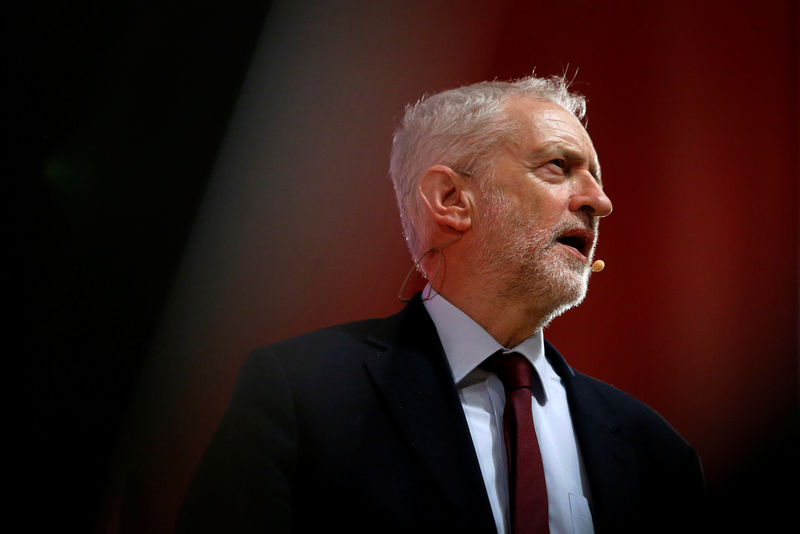By Elizabeth Piper
LONDON (Reuters) - Britain's opposition Labour Party ought to be rubbing their hands with glee as the governing Conservatives tear themselves apart in a Brexit-induced civil war.
Conservative rebels tried, but failed, this month to oust Prime Minister Theresa May as party leader. Her Brexit plan is widely reviled and it is not clear whether, or on what terms, Britain will leave the European Union on March 29.
But what could have been the perfect moment for Labour to exploit the chaos in the government has shown that the main opposition party is as divided as the Conservatives.
Labour's Brexit strategy has papered over similar faultlines dividing the Conservatives and the party faithful are far from united behind their leader, Jeremy Corbyn.
Under pressure to do more to challenge the government, bring down May and force a general election, Labour attempted this week to call for a symbolic no-confidence vote in the prime minister, but the move backfired.
For now, Corbyn is reluctant to force the issue, aware that Labour could fail to topple May or secure changes on Brexit, and simply end up putting its own divisions centre stage, sources familiar with party thinking say.
"In relation to a wider no-confidence motion in the government, the issue is not if but when, and we will put it down at a time when we believe it stands the greatest chance of success," a spokesman for Corbyn said on Wednesday.
"By moving the no-confidence in the prime minister, we are making clear that we believe that situation has already arisen...The government has lost its majority in parliament, it's lost the confidence of the house and the country."
For now, the party will wait, hoping to put behind it the chaotic call for the no-confidence vote which saw party leaders flip-flop over whether to back it over the space of a few hours.
Labour was left with egg on its face because the government has to make time for parliament to hold such a vote and is not obliged to.
"Only Jeremy Corbyn could turn our mess into his mess and unite the #Conservatives #Brexit #Useless," Conservative lawmaker Anna Soubry tweeted after the move on Monday.
DIVISIONS
Britain's narrow vote to leave the EU in 2016 has torn much of the country apart, pitting families and friends against each other. Parliament is no different, blurring Britain's traditional divide between government and opposition parties.
May was forced to delay a vote on her deal to leave the EU until the week of Jan. 14, after realising she did not have enough support to push it through parliament. She hopes new "assurances" from the EU will convince lawmakers.
As the Conservatives civil war over Brexit raged, a fragile ceasefire held sway in Labour's ranks, though with Britain's EU divorce now just 100 days away, that may be coming to an end.
Labour wants a permanent customs union with the EU and a close relationship with the bloc's lucrative single market. The policy has been dubbed "constructive ambiguity" by some critics, who question whether Labour could negotiate a better deal.
Corbyn, a Socialist with little passion for the EU, has been happy to go along with the policy as long as the vote to leave the bloc is respected.
But he is under increasing pressure to back a second referendum to break the impasse in parliament, even from some in his team, something he has been reluctant to embrace for fear it will alienate Labour supporters who wanted Brexit.
Corbyn's team simply says a so-called people's ballot is an option "if others have been exhausted".
Labour's main goal has been to win an early election so that it can renegotiate the divorce deal, but forcing a snap election requires a majority in the House of Commons Labour does not have.
Northern Ireland's Democratic Unionist Party, has said it will continue to prop up May's minority Conservatives -- unless the prime minister's Brexit deal is passed in its current form. She insists her deal is the only one the EU will accept.
Policy decisions are increasingly giving way to parliamentary arithmetic - with all sides trying to guess which way lawmakers could turn, not just over Brexit, but also over any vote to topple the government.
But as time ticks away, the options are narrowing and some analysts say an extension of the Article 50 notice to leave the EU is becoming more likely.

"Our focus has to be stopping her running down the clock so she can demand her deal or no deal - a highly irresponsible strategy going against the grain of her party and the mood in the country," Labour lawmaker Seema Malhotra told Reuters.